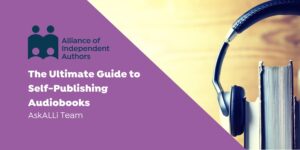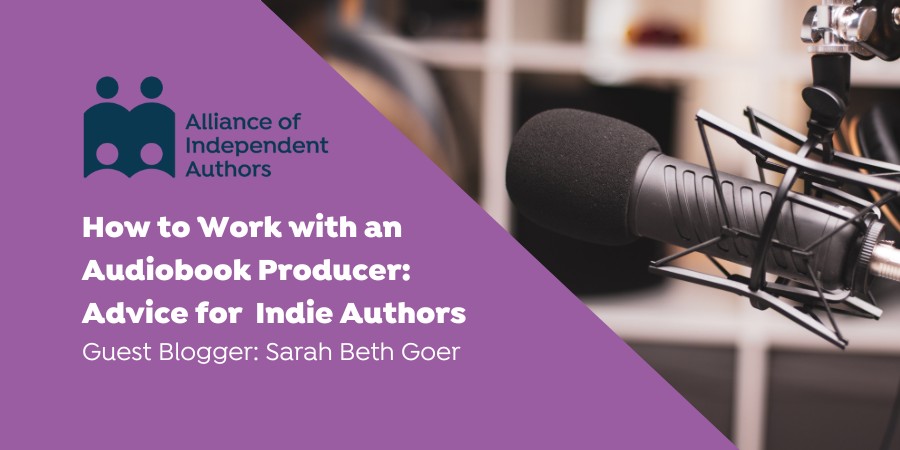What is an audiobook producer, are they right for you, and what can you expect from working with them? Find out with this Alliance of Independent Authors (ALLi) guest post by Sarah Beth Goer.

Sarah Beth Goer
Sarah Beth Goer is an audiobook producer and narrator who has worked extensively with both independent authors and major publishers. As a narrator, Sarah’s clients include Harper, Scholastic, Hachette, Penguin, and Random House. As a producer, Sarah has worked with multiple bestselling authors.
What is an audiobook producer, and what do they do?
Let’s say you’re an author who wants to get your books into audio, but you have neither the time nor the inclination to manage your audiobook production yourself – hiring your narrator(s), overseeing the production, troubleshooting any problems that may arise, etc.
What do you do?
Many authors I’ve met know of only one option, and that’s selling their rights to an audio publisher (assuming they can obtain an offer from an audiobook publisher, of course). And while that option can be a good fit for some authors, others are hesitant to trade away such a large portion of their audio royalties.
That’s why I like to make sure every author knows that if you don’t want to manage your own audio and you don’t want to (or aren’t able to) sell your rights, there’s another possibility to consider: hire an audiobook producer.
An audiobook producer is someone who will, for a one-time fee, manage your audio for you. They do the work, and you keep your audio royalties.

Photo by Jonathan Farber on Unsplash
Is working with an audiobook producer right for you?
Okay, great. So now we all know that two options exist: to hire an audiobook producer or to sell your audio rights. But which option is right for you?
The answer is: it depends! Let’s go over some logistics that can help you make an informed decision about what fits best for you and your business.
-
Upfront financing
If a publishing company buys your rights, they will typically pay for production as well as sometimes pay you a small advance. If you hire a producer, you will be paying for both the audiobook production and the producer yourself. Therefore, the calculation you are making, if you’re deciding whether to hire a producer, is whether retaining your royalties is worth the trade-off of paying out of pocket for a producer and production up front.
Start by getting a very rough idea of how well your audiobook is likely to sell. There are no guarantees, and paying for production is certainly always a risk. But a good rule of thumb is that if your book made enough in its first month or two of sales to pay for the cost of the audiobook, you’ll likely make a solid return on audio in the long run. (And if the first month or two of sales would pay for the cost of audio many times over? Well then, your audio should do quite nicely. But again, nothing’s ever for certain).
-
Royalty payments
Next – if you are considering selling your rights, look carefully at the deal offered by the publisher; it’s vital to understand the numbers correctly. When a publishing company offers you a royalty percentage, that percentage is based on what they will make. It is not based on total available royalties.
For a concrete example, let’s look at what that would mean for your royalties with the largest audiobook distributor, Audible/Amazon. Now, we don’t know for sure what any particular publisher’s deal with Audible/Amazon is, but we do know publishers are not typically distributing exclusively with them, and we do know that the industry standard for a non-exclusive deal with Audible/Amazon is 35 to 40%. So when a publisher offers you, for example, a 20% royalty deal, you’re making 20% of 35 to 40%. AKA, you’re making between about 7% to 8% royalties on Audible/Amazon.
You can compare that to the 40% you’d make if you distributed exclusively to Audible/Amazon on your own following production with an audiobook producer, or 25% if you chose to distribute non-exclusively.
Of course, in order to weigh all your options, you’ll also need to know how much it would cost to pay for an audiobook producer and production out of your own pocket up front and compare that number to the higher royalties you can expect via this route. That answer varies from one producer to another, so I recommend getting in touch with producers you’re interested in to find out more about costs and make a comparison.
-
Publishing control
There’s another important factor to consider: your control over the publishing options for your final audio book. One key choice here is the option to produce audiobook bundles. Just as ebook bundles can be lucrative, audiobook bundles are too. And audiobook bundles cost very little to produce, since the narration and production of everything except the bundle opening and closing credits is already complete.
If you produce audiobooks yourself through an audiobook producer, you’ll have control over publishing options, including bundles. If your publisher produces your audiobooks, they may or may not look into producing audio bundles on your behalf (and surprisingly, many won’t). This can mean your audiobook sales will not be as lucrative as they otherwise might have been.
Quick summary: selling audio rights or hiring an audiobook producer?
In summary, here’s a quick overview of my own opinion: if you’d prefer to risk upfront capital in exchange for keeping all your royalties, I suggest hiring a producer. If you’d prefer to risk no capital and even sometimes make some money upfront in exchange for sharing a substantial portion of your royalties and control over your publishing options, then I recommend selling your audio rights if you can.
A word of warning…
Marketing your audiobook: Some authors like the idea of selling to a publisher because they’d prefer not to have to market their own audiobooks, and they assume the publisher will market the audiobook on their behalf.
My comment is this: please don’t make any assumptions! If you’re leaning towards selling your rights because you’re expecting to move more units with a publisher than you would on your own, I encourage you to gather concrete data. What marketing and advertising does the publisher plan to provide for your particular audiobook? Please ensure that their plan is worth to you what you will pay them in royalties.

Photo by Nick Fewings on Unsplash
Working with an audiobook producer: the process
Let’s say that after examining all your options, you think you’d like to work with a producer. Great!
Where will you find one? And once you do find one, what can you expect?
As far as where to find one, there are many options. Asking your author
colleagues for recommendations can be a good place to start. You can get
in touch with a freelance producer directly to discuss your needs, or
contact one of the many production companies in the industry.
Once you choose your audiobook producer, what will happen next?
Well, your producer’s role is to make your job easy as pie. Basically, you should be able to hand over your manuscript and let them take care of the rest!
As for more details about what your production experience will look like, it’s challenging to name any hard-and-fast rules, since the particulars will vary from producer to producer. In general, you hire your producer, and then your producer guides you through everything else.
For those of you who like to know the details of what will happen and when, here are a few pointers on what could be expected:
Ahead of audiobook production:
- Briefing: You shouldn’t need to brief your producer about your book ahead of time, as their process should include either asking you about everything they need to know or gleaning it from the manuscript itself. However, if you’d prefer to, you can put together some information about your tastes and perspective and share character descriptions that highlight your main characters’ personalities and/or vocal traits. It can also be handy to let your producer know if your manuscript contains any accents or dialects besides the primary accent of your country (for example, if you’re in the US, you can let your producer know if there are any accents or dialects in your book besides General American).
- Narrator preferences: If you have an idea in mind of what you want your main POV characters to sound like, feel free to share names of narrators or celebrities as examples.
- Trigger warnings: Letting your producer know if there are any trigger warnings for your story is always useful, as this will assist them in selecting narrators who will be comfortable with your manuscript’s material.
If anything else comes to mind that you’d really like to ensure your producer knows about, feel free to share that info with them too. They’re there to support your production, after all.
During audiobook production:
- Casting: If you’d like to be directly involved, most producers will be happy to accommodate you. If you’d prefer to be entirely hands-off, however, most producers can accommodate that request as well. So discuss the options up front.
- Cover art: While you’re waiting for the audiobook to be recorded, be sure to nab your audiobook cover art from your cover designer. Your producer won’t usually be involved in this step.
- Recording: There’s nothing for you to do but sit back and relax while your producer manages the recording process. Unless, of course, something goes wrong with the production that needs your personal attention – for example, if you’ve opted to be involved in casting and the audiobook needs to be recast for whatever reason. But, in most instances, you and your producer won’t need to touch base again until your audiobook is ready for retail.
- Distribution: Once the audiobook production is complete, you’ll need to take care of uploading your audiobook to the distribution platform of your choice (ACX, Findaway, etc.). Most producers won’t be involved in this directly but should be able to make recommendations and/or walk you through what you’ll need to do to distribute.
As I mentioned above, the exact production details will vary from producer to producer. Therefore, when you get in touch with a prospective producer, you may want to ask them about their process to help ensure you’re on the same page about procedural expectations and when and where you can get involved to suit your preferences.
In conclusion
If you’re an author who’d like to get involved with audio but doesn’t want to or cannot manage audiobook production yourself, I hope this article has been of assistance in deciding whether hiring an audiobook producer is right for you and what you can expect from the process.
Whichever path you choose, I wish you lots of success on your audiobook journey.
Sarah is an audiobook producer and narrator. You can find out more about Sarah on her website, where you can click on the ‘contact' tab to get in touch with her directly.
Top tips and watch-outs shared by ALLI members

Katy Rank Lev ( Pen Name: Lainey Davis)
Katy Rank Lev, who writes and publishes as Lainey Davis (@authorlaineydavis), has worked with producers at audiobook production companies as well as produced audiobooks independently and via royalty share.
Katy’s five top tips for indie-author audiobook production are:
- Invest well: You get what you pay for. Always. Once I saved up to use a production company for my audiobooks, I have not looked back. The producer at Blue Nose Audio handles all aspects of production for me, and it is such a relief to send off manuscript files and receive a practically perfect audiobook, fully mastered and 100% ready to upload to retailers. I especially like that they contract with union voice actors – it's important to me to know I'm helping a SAG-AFTRA performer to earn a living wage.
- Look ahead if writing a series: I write in series and like to find narrators who can commit to an entire series, so I always make sure to let producers know this ahead of time. To me, it's more important to wait for the right narrator than to get the book up quickly.
- Set financial expectations: Audio is very expensive, and I didn't expect my six-book series to earn out anytime soon. What I did was earmark funds from other endeavours to put toward my audiobook investment. For me, this was income from my eBooks on serial apps.
- Consider going wide: As a wide author, I can be nimble with my products. If there's an available retailer for my audiobooks, I take advantage. All those small monthly royalties add up over time.
- Leverage social media support: I lean into the social media reach my production company has – they always post on social media when one of my titles with them goes live, and sometimes the narrators also give me a boost! Producers can do the same.

Steven A. Leibo Ph.D.
What I've learnt from audiobook production: Steven A Leibo Ph.D
Steven A. Leibo Ph.D, the author of the Sino-American Tales series, shares one of the biggest challenge he found when producing audiobooks:
“I worked with an audio producer for two books in my series. The biggest challenge for me was working with the narrator on the very wide range of accents and foreign geographic locations and names found in my books. In short, with some works, it’s not enough to have good audio skills and an attractive speaking voice. In my case, it required very close attention and direct instruction for the audio producer.”

DJ Martin
Five lessons from working with an audiobook producer from DJ Martin
DJ Martin, author of the Ogre’s Assistant Series among other fiction and non-fiction books, shares five lessons they have learnt from working with an audiobook producer:
- Read your production and/or distribution contract(s) carefully: or, if you’re not comfortable doing so, engage an entertainment attorney. (This applies to any contract, TBH.) Most use a generic boilerplate, but some of the terms may not be favorable to you, and can be negotiated.
- Help your narrator out! If you have specific wants for a character (like a particular accent), give them a character list with descriptions. If you have non-English words in your book, give them a list with phonetic pronunciations. (This last one I highlight because I not only speak three languages but listen to audiobooks. I cringe every time I hear a non-English word mispronounced. It detracts from the enjoyment.)
- Engage your chosen narrator/producer early. This means around four months or more before you want the audiobook out in the wider world. It takes time to get on your narrator’s schedule; it takes time to get on the producer’s schedule; it takes time for corrections; it takes time for final production formatting. My original contract stated four months. Due to not only the holidays (which, in theory, were built in) but a shakeup for the producer, it took almost six.
- Be sure to proof-listen to the audio files before approving them for final production. Carefully. The original files for mine skipped an entire chapter!
- One topical issue to consider… many US narrators are members of SAG-AFTRA. Although the strike only applies to the film and TV department, you may find some narrators are also striking in solidarity. Many members of UK Equity are supporting that strike too. If you’re in a hurry, you may have to engage a different narrator. Or, preferably, be supportive and wait.
 Find out more about audiobook production for self-published authors
Find out more about audiobook production for self-published authors
For further information about audiobook production, including taking on the challenge of recording an audiobook yourself, check out the ALLi Ultimate Guide to Self-Publishing Audiobooks.




